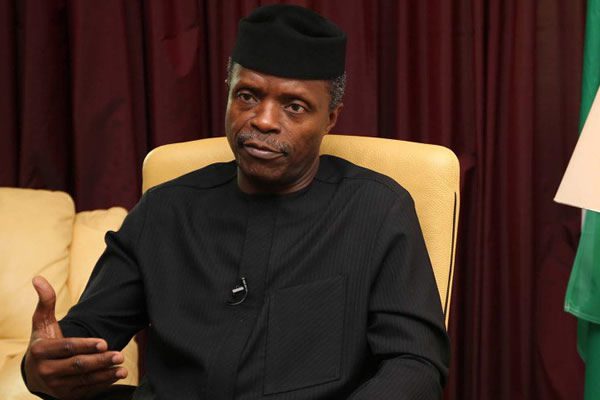Political Issues
Sectionalism: Even You, Osinbajo? -By Zainab Suleiman Okino


From his gentle mien, subtle diplomacy, recent shuttles across the South-East and South-South, to his populist approach, the acting president, Professor Yemi Osinbajo appears to be riding high as a good representative of his ailing boss and the party that brought them to power. Beyond the toga of hard and good work, is a man whose intellectual capacity towers above his petit physique. But beneath the positive endearments lie his idiosyncrasies and, perhaps, biases, typical of the Nigerian politician who would rather withdraw to his ethnic cocoon than act and behave like statesman that he should be, especially when he is entrusted with power. Judging by some of the appointments he has made in recent time, Osinbajo is proving he is not different from others. Those appointments, which are heavily slanted in favour of his Yoruba ethnic stock, have called to question his credentials as a national leader, very much like President Muhammadu Buhari, who is equally perceived as a sectional leader, despite the hope Nigerians invested in his leadership and capacity to carry everyone along and to salvage the country from the abyss of degeneracy.
Osinbajo’s less than exemplary appointments are further fuelling calls by sections, especially the South-East, for restructuring, which again is on the front burner, besides the divisive activities of IPOB/MASSOB, whose sit-at-home order recorded a huge success in the East in terms of compliance, early last week. Added to this, is the rejection of the creation of the South East Development Commission at the House of Representatives, giving fillip to the accusations of nepotism levelled against this government. The visibly angry South-East caucus in the House betrayed their emotions, and sounded like the pre-civil war Ojukwu. Their action was precipitated by the perceived marginalisation of people of the South-East, who though voted against APC, have not gotten fair representations in the government, particularly in relation to the positions of service chiefs taken mostly by the North. To be honest, we can’t build a nation where mutual suspicion holds sway and where all appointments are called to question even if the people so appointed have the competencies and qualifications, just because they have no religious and cultural affinity to us.
Unfortunately for the South-East, they are sounding like a broken record; they are neither consistent in their demand from the Nigerian government nor are they committed to the Biafra project. When the going is good (as it was during the Jonathan era when they cornered juicy positions), all was quiet on the Eastern front. And when their fortune was reversed the agitation was reincarnated.
Notwithstanding, we are better and stronger in diversity than in miniature principalities that became of the former USSR; or the possibility of a new Biafra or Niger Delta of their dreams boiling over like South Sudan; God forbid. Acting President Osinbajo made allusion to this in his speech at the colloquium on “Biafra: 50 Years After”, organised by the Yar’adua Foundation on May 25, 2017. The lecture which he titled “Greater Together Than Apart” explained that our federation might not be perfect, however the issue of nations being made up of nations is also evident in nations like the United Kingdom, Italy, Spain, United states of America and Belgium, but that “the most successful of nations of the world are those who do not fall into the lure of secession, but who through thick and thin forge unity in diversity”.
That same acting president who created an analogy he called the Nigerian dream, “in a country that does not discriminate and marginalise”, was caught in the same web (of marginalisation) when evidences were provided to show his biases in favour of his Yoruba ethnic group and his RCCG members in appointments. One of such classical cases of skewed appointments was in the constitution of a Technical Committee of (Nigerian) Industrial Policy and Competiveness Advisory Council, thus: Dr. Yemi Dipeolu, Ambassador Chiedu Osakwe, Mr. Waheed Olagunju, Olusegun Awolowo, Yewande Sadiku, Yemi Kale and Dr. Ayo Teriba. Six of the seven member-committee come from the same ethnic group as he does. There are many more cases in youth empowerment and social intervention programmes and a retinue of other appointments cornered by the acting president in favour of his kinsmen. His defence that stewards in his office are Northerners is rather lame and untenable.
Having been established that sectionalism and marginalisation fuel corruption, it is disheartening that Osinbajo fell into this ugly pit of ethnic favouritism and divisive rethoric he preached against. Therefore, the cry of marginalisation and agitation for restructuring are precipitated by our leaders’ failure to apply equity and fairness in appointments and developments across the country. The APC government under President Muhammadu Buhari took this to an unprecedented level. Sadly, Osinbajo’s shot stint so far is not indicative of a departure from accusations against his boss.
Many are disappointed with the acting President falling into this age-long divisive politics. And I’m tempted to ask if there is hope for us in Nigeria, after the once revered General Buhari has been demystified and still the last vestige of credibility in the government is being eroded. What readily comes to mind is ‘Et tu, Osinbajo?’ in reference to ‘Et tu, Brute?’ in William Shakespaere’s Julius Caesar. Et tu ‘is used to express surprise and dismay at the treachery of a supposed friend’. The Latin expression, ‘Et tu, Brute’ (Even You?), which Caesar uttered when he recognised his friend, Brutus, among the assassins at the time he was being stabbed, best describes our dismay at Osinbajo’s action
So who do we trust now? I hope Osinbajo is not all theatrics and sloganeering preaching ‘do what as I say and not as I do’?
zainabsule@yahoo.com, www.zainabokino.blogspot.com

















